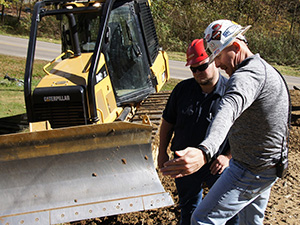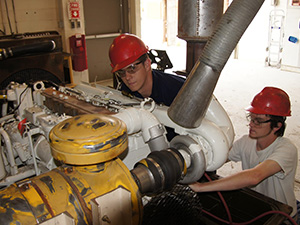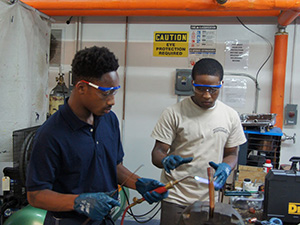IUOE Job Corps Training Programs Additional Information

"I completed Job Corps in 1988. Job Corps opened the door for a wonderful career in the Operating Engineers.
I started as an apprentice operator, and then became a journey-level grade setter. I worked my way up to become a foreman for Teichert Construction.
I am an instructor at Job Corps now giving back what was given to me. I thank Job Corps for the knowledge I received to take into the construction field and become successful". Theresa Anders
HEAVY EQUIPMENT OPERATOR
 What can I learn in the Heavy Equipment Operator trade?Students in this program are trained to become entry-level construction heavy equipment operators. During training students have the opportunity to obtain the skills to operate several types of construction equipment including bulldozers, front-end loaders, backhoes, graders, scrapers, rollers and forklifts. Every student has the opportunity to gain proficiency in a variety of functions on various pieces of equipment. In addition, students are taught how to read and set grade stakes to assist in project engineering. Classroom-related education is incorporated into hands-on training, with a heavy emphasis on safety. Students are tested periodically throughout their training to ensure they have achieved the skill levels reflected on their Training Achievement Record, and are operating the equipment in a safe and effective manner.
What can I learn in the Heavy Equipment Operator trade?Students in this program are trained to become entry-level construction heavy equipment operators. During training students have the opportunity to obtain the skills to operate several types of construction equipment including bulldozers, front-end loaders, backhoes, graders, scrapers, rollers and forklifts. Every student has the opportunity to gain proficiency in a variety of functions on various pieces of equipment. In addition, students are taught how to read and set grade stakes to assist in project engineering. Classroom-related education is incorporated into hands-on training, with a heavy emphasis on safety. Students are tested periodically throughout their training to ensure they have achieved the skill levels reflected on their Training Achievement Record, and are operating the equipment in a safe and effective manner.
What are the wages for an entry-level Heavy Equipment Operator?IUOE Heavy Equipment Operator first year apprentices can earn between $14.00 - $18.00 per hour depending on the geographic location. These hourly rates do not include the fringe benefits an apprentice can receive which can be worth more than the hourly earnings. The fringe benefit package pays for health insurance and pension plan funds in addition to other funds and committees established by the IUOE local members. Apprentice wages generally increase about $2.00 more per hour for each year completed of the four year apprenticeship. Therefore, apprentices completing an apprenticeship earning journeyperson status, make approximately $20.00 - $27.00 per hour. Whether you enter an apprenticeship or not, your wages will be based on how skilled you are as an operator and the geographic location of the job.
Where are IUOE Heavy Equipment Operator Programs located?
- Atterbury Job Corps Center located in Edinburg, Indiana
- Pittsburgh Job Corps Center located in Pittsburgh, Pennsylvania
- Anaconda Job Corps Center located in Anaconda, Montana
- Wind River Job Corps Center located in Riverton, Wyoming
- Cass Job Corps Center located in Ozark, Arkansas
- Jacobs Creek Job Corps Center located in Bristol, Tennessee
- Mingo Job Corps Center located in Puxico, Missouri
- Sacramento Job Corps Center located in Sacramento, California
- Fort Simcoe Job Corps Center located in White Swan, Washington
return to top
HEAVY CONSTRUCTION EQUIPMENT MECHANIC
 What can I learn in the Heavy Construction Equipment Mechanic trade? Students in this program are trained to become entry-level heavy construction equipment mechanics. During training students have the opportunity to obtain a variety of skills including engine and transmission repair, welding and cutting, working with electrical and hydraulic systems, lubrication and equipment maintenance, pump and compressor repair, safety, and deciphering equipment manuals. In fact, the mechanic students perform basic maintenance and repair of the heavy equipment used in the IUOE Heavy Equipment Operator Program. Classroom-related education is incorporated into hands-on training in a mechanic shop or in the field on actual construction projects with a heavy emphasis on safety. Students are tested periodically throughout their training to ensure they have achieved the skill levels reflected on their Training Achievement Record.
What can I learn in the Heavy Construction Equipment Mechanic trade? Students in this program are trained to become entry-level heavy construction equipment mechanics. During training students have the opportunity to obtain a variety of skills including engine and transmission repair, welding and cutting, working with electrical and hydraulic systems, lubrication and equipment maintenance, pump and compressor repair, safety, and deciphering equipment manuals. In fact, the mechanic students perform basic maintenance and repair of the heavy equipment used in the IUOE Heavy Equipment Operator Program. Classroom-related education is incorporated into hands-on training in a mechanic shop or in the field on actual construction projects with a heavy emphasis on safety. Students are tested periodically throughout their training to ensure they have achieved the skill levels reflected on their Training Achievement Record.
What are the wages for an entry-level Heavy Construction Equipment Mechanic? IUOE Heavy Construction Equipment Mechanic first year apprentices can earn between $14.00 - $18.00 per hour depending on the geographic location. These hourly rates do not include the fringe benefits an apprentice can receive which can be worth more than the hourly earnings. The fringe benefit package pays for health insurance and pension plan funds in addition to other funds and committees established by the IUOE local members. Apprentice wages generally increase about $2.00 more per hour for each year completed of the four year apprenticeship. Therefore, apprentices completing an apprenticeship earning journeyperson status, make approximately $20.00 - $27.00 per hour. Whether you enter an apprenticeship or not, your wages will be based on how skilled you are as a heavy construction equipment mechanic and the geographic location of the job.
Where are IUOE Heavy Construction Equipment Mechanic Programs located?
- Atterbury Job Corps Center located in Edinburg, Indiana
- Pittsburgh Job Corps Center located in Pittsburgh, Pennsylvania
- Anaconda Job Corps Center located in Anaconda, Montana
- Wind RIver Job Corps Center located in Riverton, Wyoming
- Jacobs Creek Job Corps Center located in Bristol, Tennessee
- Sacramento Job Corps Center located in Sacramento, California
- Fort Simcoe Job Corps Center located in White Swan, Washington
- Turner Job Corps Center located in Albany, Georgia
return to top
ASPHALT PAVING
 What can I learn in the Asphalt trade? The IUOE Job Corps operates two paving programs; a basic and an advanced program. The basic program provides training to gain the necessary skills for entry level employment in the paving industry. Students in this program learn the basic skills of dirt and asphalt construction equipment. The advanced asphalt paving program requires that students entering this trade have completed a basic IUOE Heavy Equipment Operator Program or the IUOE Basic Asphalt Paving Program. Students must possess basic skills in the operation of heavy equipment and a deep familiarity with the construction industry work environment in order to master the more intricate operations taught at the advanced level. Training in the advanced program may consist of travel to other Job Corps centers to complete actual paving projects. This provides you with the opportunity to represent the IUOE Job Corps Program which requires you possess the capability and desire to be an example to others. Classroom-related education is incorporated into the hands-on training in the field on actual construction projects with a heavy emphasis on safety. Students are tested periodically throughout their training to ensure they have achieved the skill levels reflected on their Training Achievement Record.
What can I learn in the Asphalt trade? The IUOE Job Corps operates two paving programs; a basic and an advanced program. The basic program provides training to gain the necessary skills for entry level employment in the paving industry. Students in this program learn the basic skills of dirt and asphalt construction equipment. The advanced asphalt paving program requires that students entering this trade have completed a basic IUOE Heavy Equipment Operator Program or the IUOE Basic Asphalt Paving Program. Students must possess basic skills in the operation of heavy equipment and a deep familiarity with the construction industry work environment in order to master the more intricate operations taught at the advanced level. Training in the advanced program may consist of travel to other Job Corps centers to complete actual paving projects. This provides you with the opportunity to represent the IUOE Job Corps Program which requires you possess the capability and desire to be an example to others. Classroom-related education is incorporated into the hands-on training in the field on actual construction projects with a heavy emphasis on safety. Students are tested periodically throughout their training to ensure they have achieved the skill levels reflected on their Training Achievement Record.
What are the wages for an entry-level position in asphalt paving? IUOE Asphalt Pavers first year apprentices can earn between $14.00 - $18.00 per hour depending on the geographic location. These hourly rates do not include the fringe benefits an apprentice can receive which can be worth more than the hourly earnings. The fringe benefit package pays for health insurance and pension plan funds in addition to other funds and committees established by the IUOE local members. Apprentice wages generally increase about $2.00 more per hour for each year completed of the four year apprenticeship. Therefore, apprentices completing an apprenticeship earning journeyperson status, make approximately $20.00 - $27.00 per hour. Whether you enter an apprenticeship or not, your wages will be based on how skilled you are as an asphalt paving operator and the geographic location of the job.
Where are IUOE Asphalt Paving Programs located? Turner Job Corps Center located in Albany, Georgia
return to top
STATIONARY ENGINEER
 What can I learn in the Stationary Engineering trade? Students in this program are trained to become entry-level workers in the field of stationary engineering. During training students have the opportunity to obtain a variety of skills such as the use of trade-related hand and power tools, maintenance and operation of refrigeration units along with safe handling in the storage, recovery , reclaiming and recycling of refrigerants; how to identify, adjust, and replace wall thermostats; troubleshooting and repair of electrical components; boiler service and repair, pump installation and repair, and working with fire suppression systems and automated fire control units. Classroom-related education is incorporated into hands-on training in a shop or in the field in areas of reading blueprints and schematics, and working with electricity with a heavy emphasis on safety. Students are tested periodically throughout their training to ensure they have achieved the skill levels reflected on their Training Achievement Record.
What can I learn in the Stationary Engineering trade? Students in this program are trained to become entry-level workers in the field of stationary engineering. During training students have the opportunity to obtain a variety of skills such as the use of trade-related hand and power tools, maintenance and operation of refrigeration units along with safe handling in the storage, recovery , reclaiming and recycling of refrigerants; how to identify, adjust, and replace wall thermostats; troubleshooting and repair of electrical components; boiler service and repair, pump installation and repair, and working with fire suppression systems and automated fire control units. Classroom-related education is incorporated into hands-on training in a shop or in the field in areas of reading blueprints and schematics, and working with electricity with a heavy emphasis on safety. Students are tested periodically throughout their training to ensure they have achieved the skill levels reflected on their Training Achievement Record.
What are the wages for an entry-level Stationary Engineer? IUOE Stationary Engineer first year apprentices can earn between $10.00 - $12.00 per hour depending on the geographic location. These hourly rates do not include the fringe benefits an apprentice can receive which can be worth more than the hourly earnings. The fringe benefit package pays for health insurance and pension plan funds in addition to other funds and committees established by the IUOE local members. Apprentice wages generally increase about $2.00 more per hour for each year completed of the four year apprenticeship. Therefore, apprentices completing an apprenticeship earning journeyperson status, make approximately $25.00 per hour. Whether you enter an apprenticeship or not, your wages will be based on how skilled you are as a stationary engineer and the geographic location of the job.
Where are IUOE Stationary Engineer Programs located? Woodstock Job Corps Center located in Woodstock, Maryland
return to top
REFERRAL, RECRUITMENT, OR HIRING AN IUOE JOB CORPS GRADUATE
If you would like to contact Job Corps directly, click here.
If you would like to refer, recruit, or hire an IUOE Job Corps graduate please contact:
Zachary Dixon, Southern Regional Coordinator
Phone: (724) 331-9207
E-Mail: zdixon@iuoe.org
Assigned Centers: Turner and Woodstock
Joseph Dixon, Eastern Regional Coordinator
Phone: (724) 675-8022
E-Mail: jdixon@iuoe.org
Assigned Centers: Anaconda, Jacobs Creek, Pittsburgh, and Wind River
Christian Hildebrand, Western Regional Coordinator
Phone: (916) 293-9164
E-Mail: childebrand@iuoe.org
Assigned Centers: Fort Simcoe, and Sacramento
John Saunders, Northern Regional Coordinator
Phone: (573) 436-0099
E-Mail: jsaunders@iuoe.org
Assigned Centers: Atterbury, Cass, and Mingo
return to top
WHAT IS JOB CORPS?
Established in 1964, Job Corps is the nation’s largest residential, educational and career technical training program for “at-promise” youth, ages 16 through 24. Job Corps Centers are open 24 hours a day, 365 days a year, with two-week training breaks held twice each year. Each year approximately 62,000 students take advantage of the Job Corps program. Last year, 90 percent of Job Corps graduates started new careers, enrolled in higher education programs or enlisted in the military. Since the program’s inception, Job Corps has educated and trained more than 2 million young Americans, preparing them for success in our nation’s workforce.
Today, Job Corps serves more than 60,000 students annually nationwide and operates 122 centers in 48 states, the District of Columbia, and Puerto Rico. For more general information about Job Corps visit Job Corps online by clicking here
HOW DOES JOB CORPS WORK?
Application for Job Corps is made through Admission Counselors. Eligible youth are assigned to a specific Job Corps center, usually one that is located nearest the person’s home and offers training of interest to the applicant. While at the center, students participate in comprehensive, career-oriented training. During enrollment students have the opportunity to earn a variety of skills, work experience, and credentials. Job Corps provides education, job training, assistance with job placement and follow-up support – all at NO COST to eligible students. Students who enroll in Job Corps can earn a high school diploma or GED, train for a new career, prepare for higher education and gain the practical skills they need to succeed in the workplace. Here are some of the opportunities available in Job Corps:
-
General Education Development (GED) Certificate or High School Diploma
-
Drivers License and/or Commercial Drivers License if applicable
-
Social Skills Training
-
Career Technical Skills in your chosen vocation
-
Completion Certificate of Career Technical Skills
-
Entry Level Industry Certifications or Credentials as applicable
-
Work-based learning with local employers and/or working on Career Technical Skills Training projects on the center on in surrounding communities
-
Employability Skills and Career Success Standards
-
Placement assistance for employment, education programs, or the military
-
Money for transition upon graduation
Job Corps is a self-paced program and as a result lengths of stay vary. Students may remain enrolled for up to two years, but the average length of stay for graduates is around 12 months. To obtain additional information about Job Corps enrollment call (800) 733-JOBS. An operator will provide you with general information about the program, refer you to the admissions counselor closest to where you live and mail you an information packet.
FREQUENTLY ASKED QUESTIONS
What kind of training is available through Job Corps? Job Corps offers career training in more than 100 occupational areas, including business technology, health occupations, hospitality, culinary arts, construction, and auto mechanics. Students also receive academic training, including basic reading and math, GED attainment, college preparatory courses and Limited English Proficiency courses. Courses in independent living, employability skills, and social skills are offered in order to help students transition into the workplace.
What else does Job Corps have to offer? Job Corps offers career planning, on-the-job training, job placement, residential housing, food service, driver’s education, health and dental care, a bi-weekly basic living allowance and clothing allowance. Some centers offer childcare programs for single parents as well.
Who is eligible for Job Corps? To be eligible for the program, an individual must:
-
Be at least 16 and not yet 25 years of age at the time of enrollment.
-
Be a United States citizen, a United States national, a lawfully admitted permanent resident alien, refugee, asylee or parolee, or other alien who is authorized by the attorney general to work in the United States.
-
Be an individual who has limited financial resources.
-
Be in need of further training, education, or support service in order to participate successfully in today’s workplace.
-
Have signed consent from a parent or guardian, if the applicant is a minor.
-
Be free of behavior problems that would prohibit self or others from benefiting from the program; be free of face-to-face court or institutional supervision or court imposed fines while in Job Corps.
-
Not use drugs illegally.
-
Have a child-care plan if the applicant has a dependent child.
-
Show commitment and capability to participate successfully in Job Corps and gain the benefits of the program.
Does it cost anything? Job Corps programs are available to those who are eligible at no financial cost.
What are the rules at Job Corps? Like any place, all Job Corps centers have rules and regulations to follow. These rules are in place to help keep you safe, to help simulate the workforce environment, and to help eliminate distractions so you can succeed in academics and training. To provide the safest possible learning environment, Job Corps has a Zero Tolerance Policy against violence and drugs. Any student who violates this policy will be removed from the Job Corps program.
Do I get paid while I am at Job Corps? Throughout your training you will receive a basic living allowance. As your training progresses, your living allowance will increase. Job Corps can also help you get started after you graduate with a transition allowance. This allowance is based on your academic and career skills achievement while in Job Corps.
Do I have to live at the center? Most students live at the center, but some centers serve nonresidential students as well. Nonresidential policies vary at each center, so check with your admissions counselor for details.
Can I bring my child with me to Job Corps? Job Corps does offer childcare assistance at some center locations. The admissions counselor will explain what options are available.
Who do I have to live with? Most centers offer separate male and female dormitories. Depending on the center, you can have anywhere from one to seven roommates.
Can I choose the center I would like to attend? Center placement is typically based on where you live and the career area in which you are interested. You will need to discuss your specific situation with the admissions counselor.
What do I have to wear? Rules about personal appearance are set by the individual center. However, generally articles of clothing with offensive wording, large amounts of jewelry or any items that promote drugs, alcohol, tobacco or violence are not allowed on campus. You will be given a uniform for career skills training classes, but you are responsible for providing your own everyday clothes.
Can I take personal belongings to Job Corps? Students should not bring expensive video and audio equipment, computers, and similar items. Students are expected to bring personal care and grooming items. Admissions Counselors can help determine what items are appropriate to bring on center.
When can I go home to visit? Job Corps will provide your transportation to and from home for your initial trip to the center, during the winter and summer breaks, and returning to your home when you leave the program. Any other trips home must be arranged and paid for by the student.
Can my family visit me on center? Yes. Your parents or guardians are invited to visit you at the center. Please contact the center in advance of the visit.
How long do I have to stay at Job Corps? Job Corps is a self-paced program. That means you learn at your own pace. Depending on the career area you choose and the learning pace you set for yourself, training can take from 8 months to two years to complete. Job Corps recommends that you remain on-center for at least one year to gain the knowledge and social skills needed for your new career.
Can Job Corps help me get into college after I graduate from the program? Some Job Corps centers have cooperative agreements with community colleges or related institutions to each career area courses or to have individual students take courses to gain college credit. Job Corps will also work with students to help them transfer into college programs when appropriate.
What if I don’t like it? Can I leave Job Corps? Yes. No one will force you to stay if you’re not happy at the center, but you must be committed to the program to benefit from it. All we ask is that you try your best to succeed. We promise you this: It will be difficult sometimes, and we will challenge you. But if you don’t quit on us, we won’t quit on you. Last year, 90 percent of Job Corps graduates found work, enrolled in higher education programs, or enlisted in the military. Your career path begins here.
What do I bring to my interview with Job Corps?
-
If you are under 18, please bring a parent or legal guardian
-
Government-issued picture ID or driver’s license/permit
-
Social Security Card
-
Birth certificate
-
Health Insurance card
-
Immunization records (your school or doctor may fax to your career adviser’s office)
-
High school transcripts or diploma (your school may fax this to your career adviser’s office)
-
If you were enrolled in special education classes, please bring your last Individual Education Plan (I.E.P.)
-
Emergency contacts: The name and complete mailing address, phone, cell, pager and/or e-mail address of a least four people who keep in contact with your (e.g., friend, parents, relative, etc.)
How can I find out more about Job Corps? Learn more about Job Corps by calling (800) 733-JOBS, or visiting https://www.jobcorps.gov
Do you have to be a high school graduate? No. Job training is not all that students can gain by joining Job Corps. To make sure graduates have what they need to get the best job possible, Job Corps offers the opportunity to earn a high school diploma or GED. The program also offers English as a Second Language (ESL) classes at many centers. Students at Job Corps work toward a diploma or GED at their own pace and receive periodic progress evaluations.
How will Job Corps help find me a job? Job Corps does more than just train and educate teens and young adults. When a student completes the program, a Job Corps career transition specialist will help him or her make the transition into the workplace. The specialists help students practice interview skills, finalize resumes and find jobs that match their training. These specialist are in contact with local and regional businesses daily, and they know what businesses have the best job openings. Career transition specialists maintain contact with Job Corps graduates for 6 months to help them overcome new challenges and stay on track for success.
Does Job Corps offer assistance with college after successful completion of the program? Some Job Corps centers have cooperative agreements with community colleges or related institutions to teach career area courses or to have individual students take courses to gain college credit. Job Corps will also work with students to help them transfer into college programs when appropriate.
What if I get homesick? One of the most common problems Job Corps students experience is homesickness. In some cases, students have never lived away from home. It is understandable that you may feel anxious about leaving home and moving to a center in a different city or state. Most students attend the Job Corps center closest to their hometowns, but the transition to life away from home can still be a challenging experience. Homesickness can make small problems appear larger than they really are. This is common during the first couple of months until you adjust to this big change in your life. In time, most students find Job Corps a rewarding program that helps you grow personally and well as professionally. You not only learn the skills you need to gain employment in good paying, quality jobs, but also develop the social and employability skills necessary to thrive in today’s workplace and to succeed in life. Each student learns to take on new responsibilities while adjusting to life in Job Corps, including cleaning your room and certain areas of the center campus on a regular basis, and participating in community service projects.
return to top
ENROLLMENT
If you have questions or need additional information about enrollment in the IUOE Job Corps Training Program please contact:
Zachary Dixon, Southern Regional Coordinator
724-331-9207
email: zdixon@iuoe.org
return to top
COMMUNITY SERVICE PROJECTS
 Each IUOE Job Corps Training Program is involved in community service projects which save the government or non-profit organizations thousands of dollars annually. A few of the organizations the IUOE Job Corps Programs have completed projects for are the Tennessee State Park System, Sullivan County Sheriff’s Department, Habitat for Humanity, Albany Parks and Recreation, City of Beaumont, City of Moreno Valley, City of Sacramento Police Department, Yakima Humane Society, Indian Creek High School, Duck Creek Township, City of Puxico, City of Altus and the College of Ozarks. Community service projects completed by the IUOE Job Corps Program during the past forty years total millions of dollars in savings. These projects have included work such as disaster relief and cleanup, generator repairs and maintenance, paving, grade work, building athletic fields, slope staking, finish grade stakes and storm drain stakes.
Each IUOE Job Corps Training Program is involved in community service projects which save the government or non-profit organizations thousands of dollars annually. A few of the organizations the IUOE Job Corps Programs have completed projects for are the Tennessee State Park System, Sullivan County Sheriff’s Department, Habitat for Humanity, Albany Parks and Recreation, City of Beaumont, City of Moreno Valley, City of Sacramento Police Department, Yakima Humane Society, Indian Creek High School, Duck Creek Township, City of Puxico, City of Altus and the College of Ozarks. Community service projects completed by the IUOE Job Corps Program during the past forty years total millions of dollars in savings. These projects have included work such as disaster relief and cleanup, generator repairs and maintenance, paving, grade work, building athletic fields, slope staking, finish grade stakes and storm drain stakes.
return to top